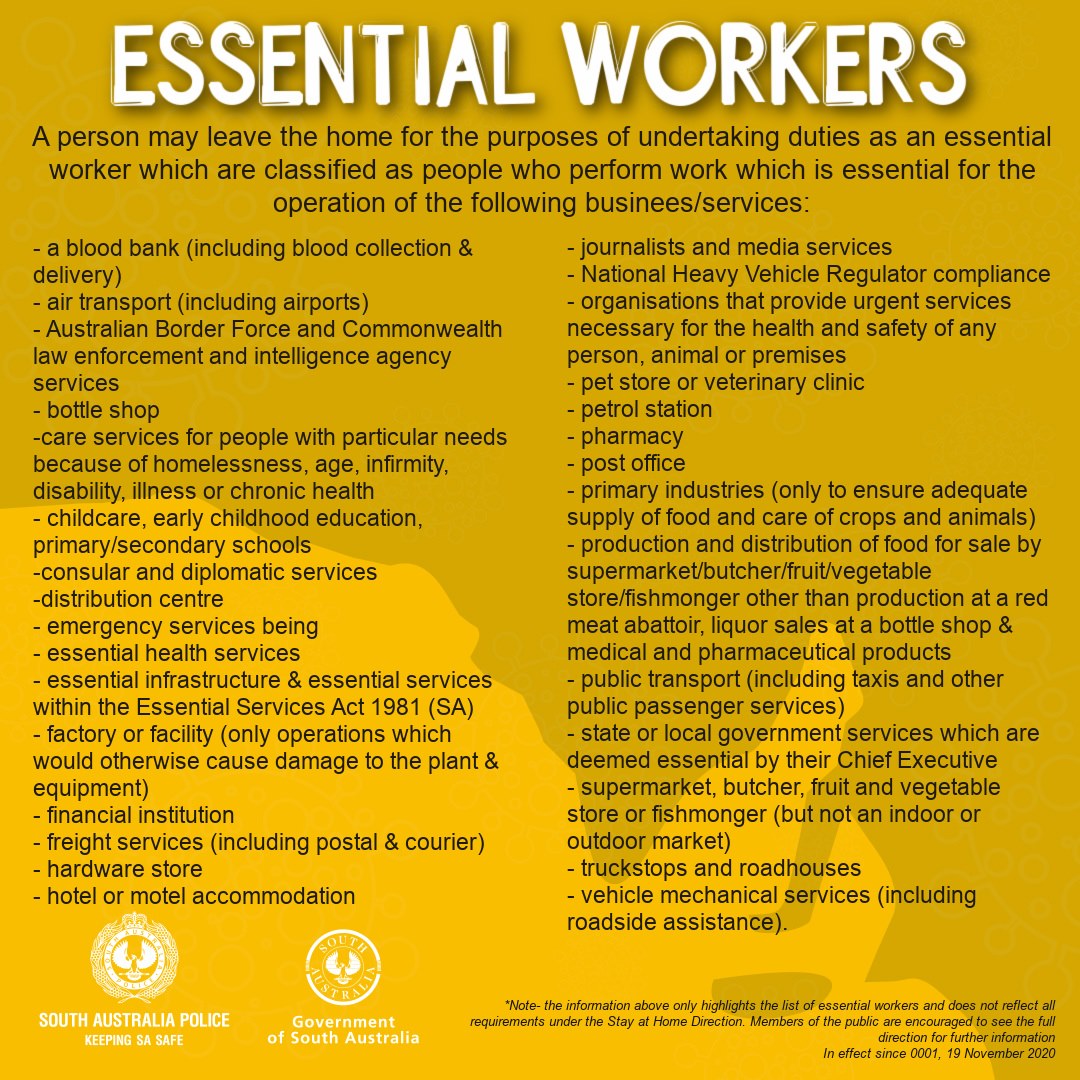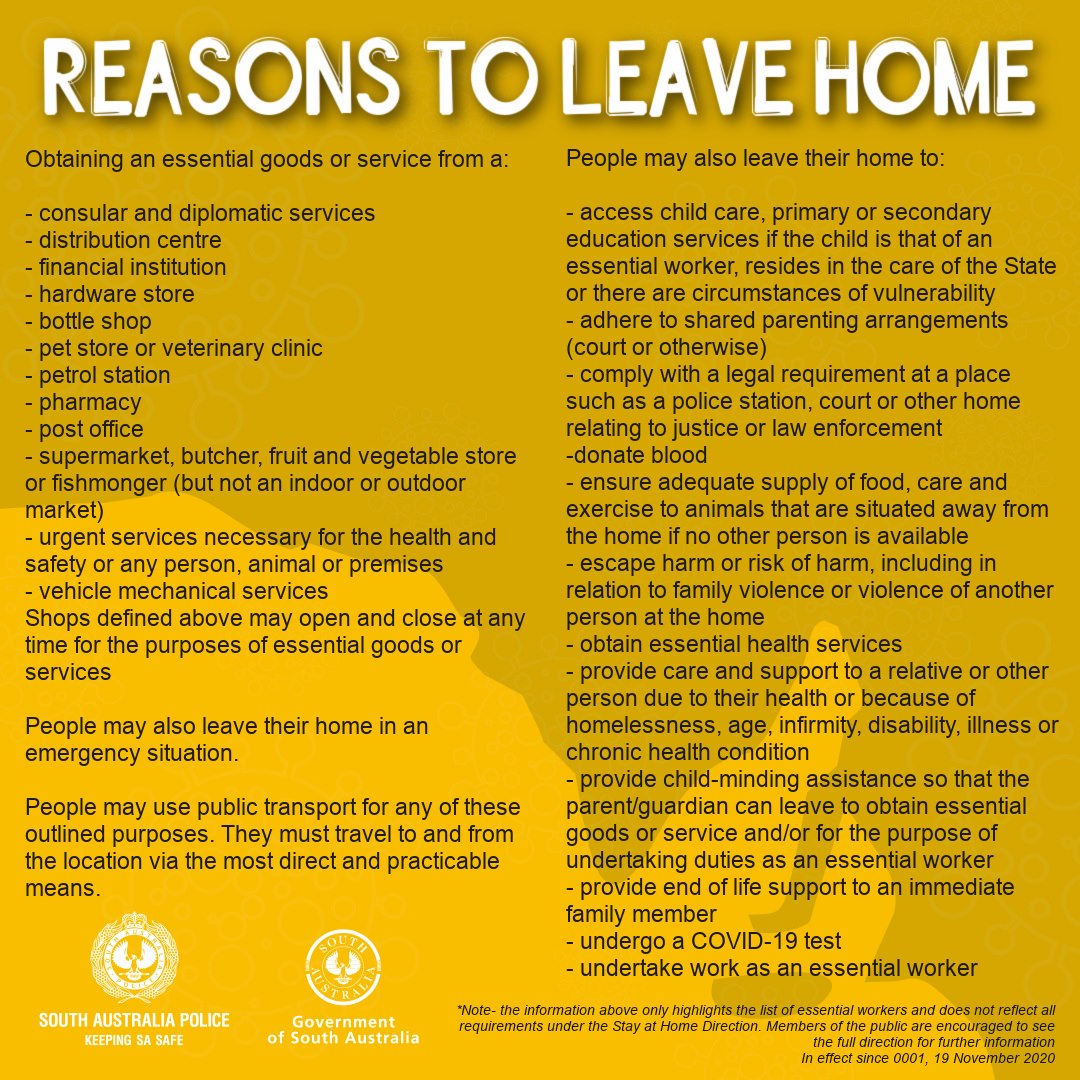SỰ KIỆN CHÍNH
NHÂN VIÊN CẦN THIẾT
LÝ DO ĐỂ RỜI KHỎI NHÀ
BẢN GỐC TIẾNG ANH TỪ SOUTH AUSTRALIA POLICE
A new Direction has been issued in relation to the Stay at Home requirements for South Australia as a Circuit Breaker to the current COVID-19 outbreak.
.
The Emergency Management (COVID-19) (Stay at Home) Direction 2020 has been issued. This Direction comes into effect as of 0001 Thursday 19 November 2020 and is applied alongside all other Directions that are currently in place under the Emergency Management Act 2004 (SA) but prevails where any inconsistencies may arise.
.
KEY FACTS
➡️ The Stay at Home period will begin at 12.01am on Thursday 19 November will end on 12:01am on Wednesday 25 November 2020. All people in South Australia will be required to Stay at Home for the entire period.
➡️ Community activities including business, professional, educational, academic and government activities MUST STOP operation unless it is carried out in line with this direction or does not involve leaving the home.
➡️Once the Direction commences people must travel as quickly as possible, but within 24 hours, via the most direct practical route home and must remain there for the entire period.
➡️ This does not apply if a person is otherwise advised by a medical practitioner to relocate. Similarly, this is not applicable to a person if they do not have a home to reside, if it unavailable or if the person is at risk of harm if they were to stay.
➡️ All gatherings are prohibited other than between those who ordinarily reside at the home or as part of an activity occurring in accordance with this direction.
.
ESSENTIAL WORKERS
A person may leave the home for the purpose of undertaking duties as an essential worker which are classified as those people who perform work which is essential for the continued operation of any of the following operations/businesses;
▪️ a blood bank (including blood collection and delivery);
▪️ air transport (including airports);
▪️ Australian Border Force and Commonwealth law enforcement and intelligence agency services;
▪️ bottle shop;
▪️ care services for people with particular needs because of homelessness, age, infirmity, disability, illness or chronic health;
▪️ childcare, early childhood education, primary/secondary schools;
▪️ consular and diplomatic services;
▪️ distribution centre;
▪️ emergency services being: ambulance services, firefighting services, medical retrieval services (including Royal Flying Doctor Services), military and defence services deployed activities in South Australia, paramedical services, police services and state emergency services;
▪️ essential health services;
▪️ essential infrastructure and essential services within the Essential Services Act 1981 (SA);
▪️ factory or facility (only operations which would otherwise cause damage to the plant and equipment);
▪️ financial institution;
▪️ freight services (including postal and courier services);
▪️ hardware store;
▪️ hotel or motel accommodation;
▪️ journalists and media services;
▪️ National Heavy Vehicle Regulator compliance activities;
▪️ organisations that provide urgent services necessary for the health and safety of any person, animal or premises (e.g. plumbing, Centrelink services and Foodbank);
▪️ pet store or veterinary clinic;
▪️ petrol station;
▪️ pharmacy;
▪️ post office;
▪️ primary industries (only to ensure adequate supply of food and care of crops and animals);
▪️ production and distribution of food for sale by supermarket/butcher/fruit/vegetable store/fishmonger other than production at a red meat abattoir, liquor sales at a bottle shop and medical and pharmaceutical products;
▪️ public transport (including taxis and other public passenger services);
▪️ state or local government services which are deemed essential by their Chief Executive;
▪️ supermarket, butcher, fruit and vegetable store or fishmonger (but not an indoor or outdoor market);
▪️ truckstops and roadhouses, for transport and freight drivers; and
▪️ vehicle repair and mechanical services (including roadside assistance).
.
REASONS TO LEAVE HOME
One person (a dependent or person for whom the one person provides care can also attend) can leave their home for the purposes of obtaining an essential goods or service from a:
▪️ consular and diplomatic services;
▪️ distribution centre;
▪️ financial institution;
▪️ hardware store;
▪️ bottle shop;
▪️pet store or veterinary clinic;
▪️ petrol station;
▪️ pharmacy;
▪️ post office;
▪️ supermarket, butcher, fruit and vegetable store or fishmonger (but not an indoor or outdoor market);
▪️ urgent services necessary for the health and safety or any person, animal or premises; and
▪️ vehicle mechanical services.
Shops defined above may open and close at any time for the purposes of essential goods or services.
People may also leave their home to:
▪️ access child care, primary or secondary education services if the child is that of an essential worker, resides in the care of the State or there are circumstances of vulnerability;
▪️ adhere to shared parenting




